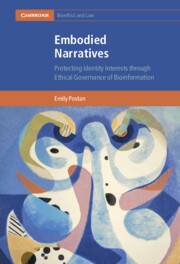Reading Embodied Narratives: Protecting Identity Interests through Ethical Governance of Bioinformation is a salutary reminder of how recently the circulation of mass data about our own and others’ bodies has become a normal part of everyday life. Despite this relative novelty, bioethics has already generated an impressive body of literature on the ethical and legal issues connected with making human bioinformation easily available. Most of this existing work examines the actionable consequences of acquiring data about a person’s genome, microbiomic profile, or neural architecture: how such knowledge might affect someone’s cancer diagnosis, treatment choices, their chances of crossing a border, getting insurance, or being convicted in a court of law.
Much less attention has been given to the possibility that knowledge from and of one’s body might have other important effects. There is curiously little discussion, for example, of why patients might find it important to know (or not to know) some aspect of personal bioinformation, even if that knowledge has seemingly no influence on their subsequent choices or actions. In this book and in clear and engaging style, Emily Postan demonstrates how the collection of information from and about the human body – and sometimes even just the expectation that such bioinformation will be gathered and used – affects our individual and collective identities in profound and often unexpected ways.
What does it mean to ‘know who you are’, and how is that affected by the historically unprecedented health and bio-related data now available to us? What we are concerned with here is identity as the set of characteristics that make each person a distinct and particular individual. Postan’s view is that while information about our bodies has always played an important role in self-constitution, the massively expanded availability and variety of bioinformation, and the extent to which it is now generated and controlled by other people, fundamentally alters the landscape and tools of personal identity.
With this as her starting point, Postan draws on theories of identity as constituted through narrative, and the claim that a meaningful identity narrative is essential to making sense of our lives, to our capacity for self-determination, and to our exercise of agency. The argument then is that because of the role that knowledge and experience of the body play in our narratives about ourselves, personal bioinformation has profound consequences for our ability to ‘occupy our own narrative accounts’ of who we are. The abstraction that we call ‘health data’ is a confirmation of the embodied nature of identity: that the material actuality of body form and function provides a good part of who you feel you are. Personal bioinformation can provide a way to make sense of and articulate embodied experience and, in doing so, make it available to the composition of an inhabitable self-narrative.
This view differs in two important respects from more familiar claims in law, policy, and scholarship about the effect of knowledge about our bodies on identity. First, it directs attention away from concerns about how others’ use of our information might affect us and towards our own reactions to and uses of such information. Second, in doing so, it directly confronts the easy assumption that if bioinformation has significance for building a sense of self, then that must mean personal identity in some way flows directly from, and is fixed by, bodily materiality. Postan’s argument is that what people do with bioinformation is rather more sophisticated and complex than that, and to demonstrate this, Embodied Narratives tests out the emerging theory of bioinformation and identity against empirical evidence. This key part of the book uses three case studies of bioinformation, involving knowledge of donor origins, genetic predisposition to disease, and neuroimagery in psychiatric diagnosis, to examine how those involved talk about the effect of the personal information they receive on their self-conception and understanding of their past and future.
Recognising the importance of body knowledge to the construction of a working identity clearly has major ramifications for those public and private agencies that generate, hold, or control access to our personal bioinformation. Part of Emily Postan’s argument is that people have real, justifiable, and ethically significant interests in their identity-relevant biodata, whether or not access to that information appears objectively ‘useful’ in terms of guiding healthcare or other decisions. This is an important conclusion not just for ethics and law but also for anyone trying to make sense of the bioinformation-saturated society in which we live. It sets a starting point for a detailed exploration of the governance and law that will be needed to protect these interests appropriately.
The appearance of Embodied Narratives is a milestone in the development of data ethics and in building a deep understanding of how technology can change individual and collective identities. More generally, it marks a significant evolution in empirically informed normative ethics. There will be bioethicists, bioinformatics specialists, and philosophers of identity who disagree with its arguments and conclusions, but what Emily Postan has provided them with is an account that is worth engaging with: serious, nuanced, and provocative.

